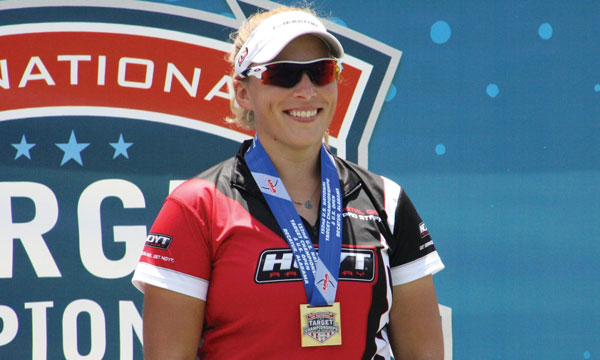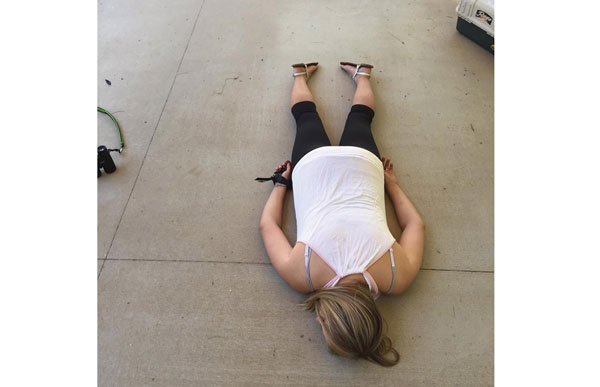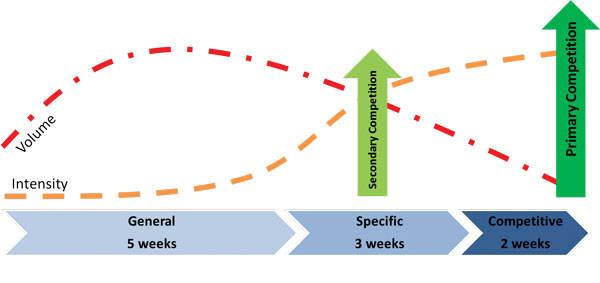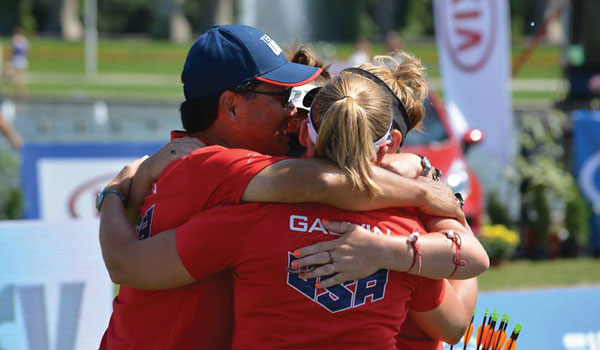Tired, snappy, or lacking enthusiasm? It could be burnout – Crystal Gauvin explains what to look for and how to treat it

Jesse Broadwater has said he’s faced many burnout phases during his career
If you have been a part of any sport for a while, there is a good chance you have experienced some level of burnout (or you know someone who has). In fact, burnout is now considered a mass phenomenon for sports participants of all ages with supportive research indicating that female athletes tend to be most affected*.
As a sport, archery is primed for burnout. By its very nature archery, as an individual sport, is highly repetitive, awards a repeatable process and tends to keep the shooter stationary. It tends to attract those with maladaptive perfectionism (rigid standards and unrealistically lofty expectations that one places upon themselves) and tends to encourage specialising in a single sport at an early age.
For example, Jesse Broadwater has shot competitive archery since he was eight years old. And for the past 25 years, archery has been a major focus of his every year. Not only does he compete at events on a regular basis, but he is constantly answering questions, helping people with problems, working with companies on product development, attending trade shows, tinkering in his shop, and constantly trying different things to improve his shooting. Additionally, he says, “there is a lot of travel and time away from your family. Anybody that does this will eventually face a “burnout” phase. I have been there numerous times.”
A variety of studies document how specialisation in a single sport frequently leads to overtraining and neglect of proper rest. Overtraining is counterproductive as continually physically over-exerting oneself has negative consequences on the athlete’s mental capacity. With the unpredictability of sport, being unable to cope with challenges or changes can lead to excessive stress and in turn, burnout. As Braden Gellenthien puts it, “Whether you’re lucky enough to be doing your dream job or stuck doing something just to pay the bills, burnout will happen – it’s inevitable. Burnout can vary in levels from simply finding work, or a hobby, more or less interesting from day to day or even dreading the idea of partaking.”

Crystal says she knew she was experiencing burnout after winning a National title and not feeling any excitement
What Exactly is Burnout?
Burnout is when an athlete has completely lost interest in their sport (it can also apply to jobs, musical instruments, and so on.) Athletes may experience overwhelming exhaustion from training and competing. They might resent their teammates and coaches, or have difficulty achieving previously established scores or demonstrated skills.
Burnout can be easily broken down into internal factors and external factors. Internal factors include perfectionism, elevated expectations, or loss of love for the sport, while external factors consist of physical exhaustion, excessive time commitments, and even injury.
Recognising burnout, and knowing how to treat it, is very important for how successful you are and for your longevity in the sport. In my experience, many top archers go through varying phases of burnout each year. For example:
“Starting around Thanksgiving, I will start ramping up for the indoor season, and I will be excited about it. But depending on how practice and the tournaments are going for me, I start to see signs of getting burnt out on indoor at the end of February or March. Often, after the Vegas Shoot, I just want to get the last couple of indoor shoots done and move on to the next style that I’ll be shooting. Outdoors to me is always a breath of fresh air, figuratively and literally. There are so many more variables with shooting outdoors that I seem to be able to stay interested and motivated and not to get burnt out on it as quick. But I get deep into the season, and I’m usually starting to get tired of all the travel, being away from family, missing important things at home and all that. And that process and those thoughts start to come into play. So it may not even be the preparation or the competing part that is wearing on me, but the other variables that are involved in being a full-time professional archer.”

Burnout is often thought of as a mental problem, but constant tiredness or decreased
energy levels can be physical symptoms
How to Recognise Burnout
Because it is very difficult (almost impossible) to perform at your best when your sport feels like a chore, it is important to recognise the signs of burnout. Here are some of the main warning signs to help you spot burnout before it reaches a crippling level.
Physical symptoms: Most people relate burnout to a “mental health” issue, but in reality, many burnout symptoms manifest themselves on the physical body. This includes things like:
Chronic fatigue/insomnia. After a full night of rest, do you still wake up feeling exhausted? Do you have a feeling of constant fatigue or wanting to go to sleep, no matter what you do during the day?
Increase in injury or sickness. Have you noticed your immune system lacking lately? Do you always seem to get sick or catch a cold? Do you feel like you are more prone to injury than you were previously? Does it take longer to heal or recover than in the past?
Decrease in energy levels. Have you noticed a decrease in your strength or stamina during the day? Do you feel like you must exert more effort to achieve the same results as previously? Do you need to take more frequent breaks to make it through your workout?
Loss of appetite. At first, you may notice you are not as hungry as you were previously. You may eat less at meals or skip them altogether. As burnout gets worse, you may notice this symptom manifests itself as a complete loss of appetite and/or significant weight loss. The opposite can also be true, with burnout leading to an increase in calories consumed, as a way to combat the stress your body is feeling.
Behavioral symptoms: It can be hard to spot burnout on your own, but many times those around you will notice the warning signs. Examples of these symptoms are:
Making excuses for substandard performance. We can all end up doing this from time to time, but when excuses become the norm, that is a sign of burnout.
The inability to focus. Do you find that your mind is never on the field with you? Are you spending your time at practice thinking of other things you could be doing? Do you get to a tournament and realise you aren’t sure what you are supposed to be doing?
Frequent absence. Do you find yourself coming up with reasons to skip practice? Do you “fight” or resist your coach’s suggestions on a regular basis? Have you stopped asking for advice or showing up for extra help?
Lack of enthusiasm. Do you dread going to practice every day? Do you head to a tournament with fear instead of excitement? Have you lost the enjoyment you once felt when you picked up your bow? As Jesse says, “the main sign that tells me I’m getting burnt out is when my drive to go out and practice is gone. When I have to force myself to put in the effort.”

Fig 1. A good coach will help you plan and balance your performance goals with your physical capabilities
Emotional symptoms: These are probably the easiest symptoms to spot and most associated with burnout. They include:
Irritability. Do you get angry more easily or experience apathy for things you used to care about? Are you snapping at people you care about, or do you find yourself struggling to appreciate wins?
Insignificance. Many athletes experiencing burnout will begin to feel like their performance is insignificant, either to them individually or to their team. They will tend to pull away and stop trying as hard. Have you ever thought, “What’s the point?”
Decreased confidence. Building off the last point, this leads to decreased confidence. An athlete will begin to question their skills and abilities. This self-doubt leads to self-fulfillment of lower scores and can quickly spiral out of control.
Desire to quit. That takes us to the “final” stage of burnout, which is the desire to quit. Have you ever said to yourself, “Why bother? Why am I killing myself just to embarrass myself on the field?” The desire to quit makes it difficult to focus, to practice, and to even care about your results.
When an athlete reaches this level, they will either make a change or leave the sport fairly quickly.
As Braden points out, “It’s important to weigh your struggle and determine if it’s something you can work through or if the problem is deeper than “burnout” and you’re actually spending your time doing something that you’re “addicted” to and are wasting time, energy or resources that would be better served doing something else. Fulfill yourself as a person, take care of all of your emotional and financial needs, and then focus on your hobbies/interests – you’d be surprised how often burnout can disappear from simply putting things into the proper perspective.”
How to Recover from Burnout?
Ultimately, rest and time away from your sport are the two best methods to prevent and treat athlete burnout. This can be very hard, especially in the middle of your competition schedule. Some things to keep in mind if you think you are experiencing some level of burnout are:
More is NOT better. Society wants us to believe the fallacy that more is better, but when it comes to sports, this is simply not the case. Create an off-season. All professional athletes have one; you should too. More times than not, it just takes getting away from your sport and doing other things to make you want to come back and start again.
Schedule time off. Just like many jobs in the “real world” schedule Saturday and Sunday as days away from the office, it is vital to schedule in days away from archery. Plan one day a week where you do NOTHING archery related. Find another hobby (or three!), spend time with your family and friends, or clean your house. Think of this as a day to recharge your batteries and find enjoyment outside of your sport.
Remember why you started. The better you get at a sport, the harder it can be to remember why you started in the first place. Goals change, priorities shift, but it is important to remind yourself from time to time what you grew to love about the sport in the first place. Make lists of your favorite things about archery, spend time with those newer than you, helping them develop a passion for it, or put your “why” out in the open where you can see it every day. Find something positive to focus on, no matter how hard it can seem.

Take a good look at your schedule and make sure you’re not planning so much in it is impacting your goals or your health
Coping tools. We all are going to feel stressed and experience signs of burnout from time to time. The important thing is developing techniques to reverse the effects before it gets out of hand. Some people have success with breathing techniques; others find playing a game on their phone is helpful. Ultimately, what works for me might not work for you, so it is important you find tools that allow you to continue down the path towards your goals.
Get enough sleep. One of the easiest ways to encourage burnout, or make it worse, is a lack of sleep. Burnout’s primary symptom is long-term exhaustion, so you need to improve the quality of your sleep if you want things to get better. The worse your symptoms, the more sleep you need.
Create unpredictability. Don’t simply go out and shoot 300 arrows every day. Monotony in practice can easily lead to burnout. Simply doing something completely out of the ordinary can make a dramatic difference. Reversing your routine is a great way to feel refreshed, and it takes very little work.
Stop focusing on the outcome. Ask yourself “What went well today?” rather than “How did I score today?” Write your goals so they align more with the process than outcome. This will help you achieve victories, even during times of struggle.
Restructure your schedule. As many top archers have discovered, cutting out some shoots and travel that aren’t entirely necessary can go a long way towards helping with burnout. Instead of going to every tournament, focus more on the ones that are important to you. You can also change up your practice (whether through periodisation, incorporating new drills, challenges, and so on). This will help keep you motivated, excited and sharp throughout the season.
Finally, surround yourself with a good team. A dedicated support system is critical to success and avoiding burnout, no matter what level you’re shooting. Find a coach that understands balance; one that will push you to reach your potential, but one that knows the benefits of rest and recovery. Spend time at tournaments with archers who are positive and realistic. If all your time is spent with people who are miserable and not enjoying themselves, you will begin to fall into the same trap. Practice with people who are better than you, but also with those further behind you in their path. Learn to find joy in everyday practices and celebrate successes, no matter how small.
*Heidari, Soghra. “Gender differences in burnout in individual athletes.” European Journal of Experimental Biology 3(2013):583-588
This article originally appeared in the issue 120 of Bow International magazine. For more great content like this, subscribe today at our secure online storewww.myfavouritemagazines.co.uk

